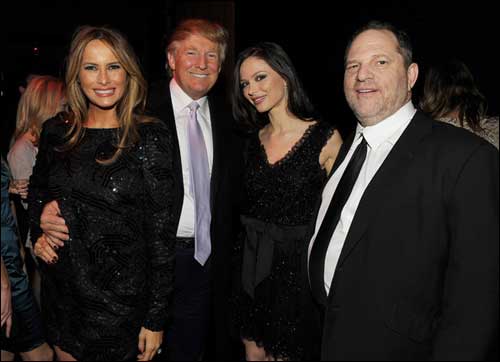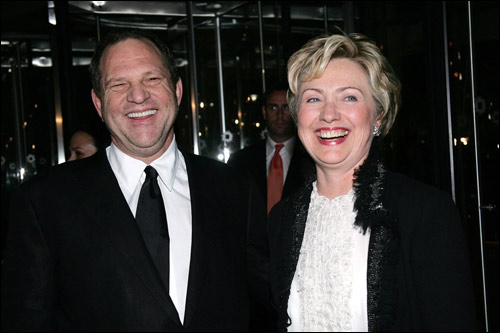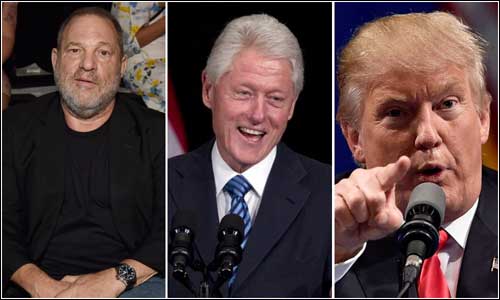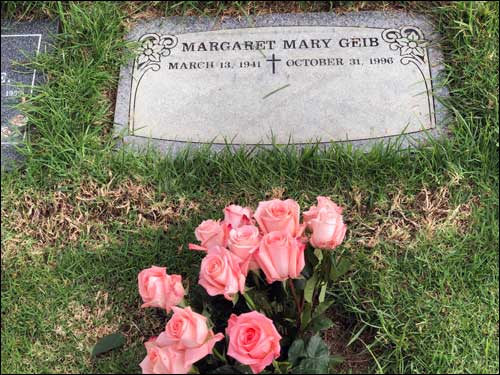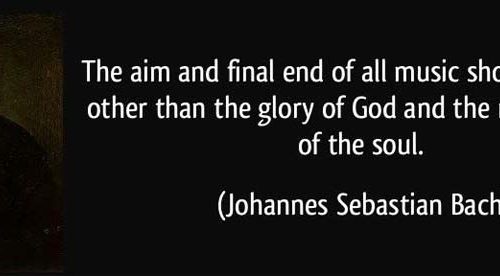“Nearly all men can stand adversity, but if you want to test a man’s character, give him power.”
Abraham Lincoln
It is said that “rich and powerful men are a powerful aphrodisiac for women” – I remember hearing this line during the late 1990s with the Bill Clinton “bimbo eruptions” that culminated in the infamous Monica Lewinsky scandal and impeachment trial.
I have no idea if women are indeed attracted to rich and powerful men. I never was rich or powerful, and it has been a long time (if ever) since women looked at me as an object of sexual desire. But it is worth asking the question in the wake of the recent Donald Trump and Harvey Weinstein dust-ups.
I suspect women are attracted to kind men with a clean and clear aesthetic sense of style who have good people skills. A sense of humor helps. Integrity helps. I imagine it has always been this way. But success and power and fame also can pique the interest of the female sex, for sure.
I have noticed that some women seem to be strongly attracted to confidence plain and simple, even when the man is an asshole. “If he thinks he is all that, then maybe he is!” these women seemed to have reasoned to themselves. I figured they would figure out the guy was an asshole, sooner or later. I was left kind of scratching my head why she would date this narcissistic guy who was mean/negligent to her.
I saw this occasionally in and around the time I was a student at UCLA in the fraternity system. Many of these women (attractive, intelligent; lots to offer a man) went on to marry self-confident blowhards. “Maybe if I marry him, he will be less of an asshole,” they reasoned. Nope. “Maybe if we have a child, it will bring us closer together?” Doubtful. I lost touch with most of these couples, but I suspect that divorce was in many of their futures.
Maybe that is more of a youth phenomenon. I suspect above all else the young prize looks and a certain je ne sais quoi in their love affairs. They are led by their loins. But I tell my single friends nowadays to look for other qualities when considering marriage. “Those sleek and sexy shoes might look like you just have to have them,” I say, “but do you really want to walk around in them for decades – think about it! A sturdy but less flashy pair of quality shoes would serve you better in the long run.” Looks should be secondary, I tell them. (“Easy for you to say,” they reply.) Think about the female supermodel of the moment who attracts so much male energy and attention. “Somewhere some guy is bored of fucking her!” a friend once observed to me. A connection made over qualities deeper than physical appearance is much more likely to prove engaging and durable.
Maybe young people can’t appreciate this yet. Older and more experienced single men and women, on the other hand, might very well be less influenced by the eye. In addition to the heart and the glands, they might use the brain. Instead of a sleek, exciting but dangerous sailing sloop, they might gravitate towards a more solid vessel that will prove seaworthy in the sometimes rough seas of matrimony. Maybe with age comes suffering which might result in something resembling wisdom. Maybe not.
Here is where Harvey Weinstein and Bill Clinton and Donald Trump enter the scene. If a young woman wants to rise in the world of movies (Weinstein) or politics (Clinton) or business/entertainment (Trump), they might very well come across such Lotharios who can advance their careers in return for sexual favors. This is the infamous “casting couch,” and from recent news reports it appears to be a very real phenomenon. Trump was recorded last year claiming the following: “I don’t even wait. And when you’re a star, they let you do it, you can do anything… grab them by the pussy.” I suspect the women involved were probably holding their noses while this creepy older guy was getting around to try what he was going to try, and they just wanted to get out of there. In modern legalese, this is “sexual harassment,” all the way up to sexual assault or even rape. But one wonders how many women gave Weinstein what he wanted, and then got acting roles as a result? A tawdry quid pro quo.
I strongly suspect the marriage between Donald Trump and Melania Knauss (our current First Lady) is a union of this kind. Donald, the billionaire, brought money and power while Melania, the model, brought physical beauty; they both knew what they were doing. Trump is 24 years older than his wife. The beautiful woman and powerful man dynamic has been going on since well before Mark Antony and Cleopatra. It can work powerfully for both parties as a sort of business arrangement.
I remember at UCLA I knew a very attractive young woman who was willingly involved with a much older man. He picked her up from her Westwood student apartment in a hired car, took her to expensive restaurants, paid for out of town vacations, etc. She told me he was excellent company: debonair and charming. He showed her a good time, even as he was old enough to be her father. “We had escargot on a Tuesday night!” she exclaimed to me. I don’t think she was going to marry this guy, but I could understand how it was a more exciting dynamic for her than dating a fellow 22-year old student (like me) who had $75 in his checking account. I am sure the same applies to some younger men and older women.
On the other hand, I think she would have dropped her elder beau if some younger guy appeared on the scene and took her breath away he was so “hot.” So maybe attraction and wealth are both factors? Different men for different reasons? A woman sizing up her choices and making a decision?
But there is always something, in my opinion, unseemly about a wealthy older man with a beautiful, much younger woman on his arm, although it happens not infrequenly. They both bring something to the union. But when accusations of coercion or the like arise in the workplace, they are alarming. When Bill Clinton or Donald Trump engages in this, I pay attention. These are politicians who wield great power in positions of responsibility. I take character seriously in such situations. The eye of the public, both young and old, is watching. It would be hard to imagine George Bush (père et fils) or Barack Obama pressuring a young intern to fellate them in the Oval Office à la Bill Clinton. But little about Donald Trump would surprise me at this point.
The problem, of course, with this older (powerful) man and younger (beautiful) woman is consent. If the terms of the transaction were crystal clear, if the woman had time to think about it in the sober light of day, if it were written down on paper what she would gain for sexual favors, then it would be more morally defensible. But I suspect some 19 year old actress, fresh and lovely, is blindsided by Harvey Weinstein while alone with him in a hotel room with no time to think or appreciate what is happening. I suspect Weinstein or someone similar “has their way” with a naive young (or not so young) woman and then frequently discards her without any advantage conferred. They do it because they can. The consent is not really there; that is the problem. The lady is not into it, and if she had more time and space to think would probably defer. Or get it all in writing, at the very least.
That, I think, is what makes Harvey Weinstein so horrifying. He seems to have parleyed a career as a movie mogul into the ability to leverage sexual acts with beautiful young actresses for decades. Wow! And the entertainment industry seems to have colluded to keep this an “open secret.” Many of my conservative friends have delighted in pillorying “liberal Hollywood” for the supposed hypocrisy in attacking Trump for sexual predation and setting themselves up as the allies of womankind. These same conservatives outraged about Weinstein did not seem to care much about Trump’s supposed sexual assaults or his recorded Access Hollywood comments caught on tape. I guess everything depends on who is making the sexual harassment claim and against whom. If it is your political party, you cut them some slack. If conservatives excused Trump’s “locker room talk” as “bluster,” liberals seemed ready to overlook Hillary’s similar Bill Clinton baggage.
I struggled with what to think about Harvey Weinstein. I thought it horrifying, but I did not care so much because I thought Harvey Weinstein not a terribly consequential person. In short, I did not initially see why Americans cared so much about this movie guy. If anything the Weinstein episode seemed to confirm my low regard for the entertainment industry: I did not expect much from them and they did not disappoint. For much of my adult life in southern California I have watched Hollywood dominate civic life, and I have held my nose. No amount of philanthropy can clean their money. Just last week I walked next to the Zemeckis Center for Digital Arts near USC and felt mild revulsion. The same is true for the “David Geffin” School of Medicine at UCLA. Yuck. It is part and parcel of the tawdry nature of Los Angeles. Show business. Sex, drugs, and rock and roll. The entertainment industry. Image and appearance; shadows flickering on the wall. Shallow, shallow, shallow.
Enough!
If you listen to the Hollywood people, they will tell you they are the creative geniuses and the artistic soul of the nation. They tell America what it should be. They tell America its stories. If so, God help us. I think that actors know what they do is inconsequential, in the end, and that is why many of them try so hard to play a role in politics or philanthropy.
And this brings me to the real point of my essay: why does America care so much about its “entertainment industry”? America cares about its actors, singers, and athletes. They are celebrities. People are interested in what they think and how they act. It makes perfect sense that anti-communist crusaders scrutinized Hollywood in the 1950s, as that industry really does exert an influence. Now we have a president with no experience in politics but whose previous job was as a reality TV star — and now we see the importance of celebrity-hood in American life.
And this, I think, is exactly the reason why so many were so upset over the Harvey Weinstein allegations is because the actresses mentioned are so well known to the American public. Tabloids publish “secrets” and photos of these celebrities and people want to know about them. Americans think they have a relationship with these people and so feel a part of their lives. So if Weinstein makes a play for Gwyneth Paltrow in 1994 and gets rebuffed by her and then her boyfriend, Brad Pitt, calls him to complain — it is as if someone you actually know was involved. You feel scandalized in a way that would be otherwise if you had never heard of them. Weinstein and his actresses are a melodrama among the Hollywood demigods. It is the high school lunchroom where salacious gossip about the “popular people” is bantered back and forth with feverish enthusiasm. “Harvey Weinstein did what to whom? Can you believe it?!?” Inquiring minds want to know.
But in the end none of it matters much.
I was reading about “neurolaw” and serial killers with my high school seniors recently, and what kept on coming up was the long-term damage caused by child abuse. Many of these horrible serial killers had been horribly abused as children. And the horrific thing about child abuse is that a three or five year old child just has no ability to fight back or to protect himself. They are so completely vulnerable. Even the worst serial killers like Joseph Paul Franklin, John Wayne Gacey, or Charles Manson were once little boys, terribly abused by their parents. And even if, in my view, the adult turned into a serial killer deserves a 9mm round to the chest the lost little boy that predates him has all my sympathy.
Child abuse. The only real ally a child in an abusive family is the state, in the guise of the children’s protective services. Social workers can take a child out of a brutalizing home and end the abuse. Social workers are my heroes. A social worker with 120 persons on her caseload who is trying to save the life of an abused child or a heroin addict is a hero, even if she fails most of the time. A social worker who rescues a child from abuse by a brutal parent is a superstar. A social worker who helps a homeless heroin addict get his life together should be a celebrity. She is doing work which could hardly be more important. She is more worthy, in my eyes, than any actress, singer, or athlete.
But nobody cares about social workers. They are paid peanuts. Sure, people will say they respect social workers and their work. But their wallets and eyeballs and actions generally suggest otherwise.
So, I asked my students seriously, Why does America venerate its entertainers so much more than its social workers? We care so much and pay so much attention to “celebrities” and their lives. We pay them inordinate amounts of money. Back in the 1920s actress Mary Pickford was “America’s sweetheart,” and that was the truth. Celebrity adulation is only much more pronounced now a century later. It is hard to underestimate. If some celebrity endorses a brand of toothpaste or a soft drink, Americans want to buy that toothpaste or that soft drink. But why? In American pop culture these celebrities are our aristocracy, for some reason. But do they do anything of real value?
A social worker can save a life. A firefighter or police officer can say the same. A teacher can help make a successful life possible through education and encouragement. Doctors and therapists can also do enormously helpful work. These are all vitally important jobs. They do real work. Engineers and construction workers build things.
But a man hitting a ball with a stick, as is happening between the LA Dodgers and the Houston Astros in the World Series right now as I type this on the evening of October 29, 2017… why is this so valuable? Why is baseball to be taken so seriously by serious people? Why do people care so much? What is wrong with America?
And why are people disappointed when a baseball player or actor or singer has a “moral failing”? What in a basketball player’s vertical jump signifies expertise in anything other than sport? Did a basketball player or an actor or a singer ask to be considered as a role model? To have their lives help up for close inspection? To make a comment on politics or society at large? The country fixated recently on pro football players and their kneeling, instead of standing, during the playing of the national anthem as a protest against police brutality. Why does anyone care about what professional football players think? It is not as if they are paid for their education or intelligence! But people do care what football players think.
I had a friend whose 10-year old son loved the Atlanta Braves baseball team and idolized its players. I gently suggested to him that he be careful and take a good long look before he declare a professional athlete to be a role model of any kind outside of sport.
It is not that I don’t esteem sports (or the arts) at all. I have always played sports and made athletics a major part of the lives of my daughters. I urge my students to remain physically active and encourage participation in school sports teams. One can learn dedication and fortitude in sports; to learn how to perform under pressure, to win when possible, and to lose with grace; and to remain physically fit and healthy. But sports are preparation for the other important things in life that have nothing to do with sport: work, family, working as a team, enduring pain, and seeing an endeavor through to the end. Sports are a means to an end and not an end themselves.
Sports are blown so completely out of proportion as to be ridiculous. Again, it is not that I decry all arts and entertainment. I don’t wish athletes to go hungry. I don’t want there to be no entertainment. But, in my opinion, it is out of control. We Americans are overfed and over-entertained; eating junk food and drinking alcohol while sitting on the couch watching sports seems to be our national pastime. Bread and circuses and cable TV for the American masses, and the circus entertainers make the profit on it. Obesity, diabetes, ESPN, and Netflix: these are the wages of Americans addicted to watching pixels dance on screens. Watching others perform while remaining inactive and sedentary themselves. Binge watching season after season of sitcom; watching football for entire Saturdays and Sundays. Escaping down the rabbit hole of social media for hour after hour with little or nothing to show for it. Trolling around Youtube looking for something interesting. Time slipping away, life slipping away. Passivity. Spectators.
I wonder why more of my compatriots don’t see it.
It amazes me.
It is not only America. I told a friend of mine from Brazil about my frustrations and he responded that it is exactly the same in his country with soccer. They make the soccer players into mini gods there. They make millions and everyone (even the poor who can’t afford to) is eager to give them their money. The rich get richer and the poor get poorer, he claims. He says soccer in Brazil is a giant scam. He further asserted the Olympics in Brazil in 2016 were a giant exercise in official corruption. Billions were stolen, he claims.
But I guess it all pans out, in the end. The price a celebrity must pay, in the USA or in Brazil, is to have her privacy completely taken away. It is to have your family life and personal appearance examined and scrutinized. One has to pay bodyguards to keep the paparazzi away. Photographers stake your home out and try to take pictures of you in unguarded moments. What price to lose your privacy so completely? To have your worst moments, along with your best, captured so publicly? How much money is that worth?
Or you can labor in obscurity with nobody who cares about you, yours, or what you do with your days. To remain unknown to the larger public. To lead an obscure existence. An isolated life.
I myself would choose Aristotle’s “Golden Mean”: to be not unknown, but to stay out of newspapers. To be known to your community for what you do in important work, but never to find your name in a headline – never to become food for the maw that feeds the insatiable stomach that is America’s 24-hour media machine. My grandfather used to say, “Fools’ names, like fools’ faces, are often seen in public places.” I will try to keep my head beneath the radar.
The same middle ground with money.
To not be poor and struggle just to pay for food and shelter, always worrying about having enough. But not to be overwhelmed with work to the point that one never has a peaceful moment. To be wealthy but rarely to have a moment to enjoy the wealth – while stress and pressure never ease. Robinson Crusoe’s father, warning his son against going to sea in search of fame and fortune, advised him to follow in his middle class footsteps:
My father, a wise and grave man, gave me serious and excellent counsel against what he foresaw was my design. He called me one morning into his chamber, where he was confined by the gout, and expostulated very warmly with me upon this subject. He asked me what reasons, more than a mere wandering inclination, I had for leaving father’s house and my native country, where I might be well introduced, and had a prospect of raising my fortune by application and industry, with a life of ease and pleasure. He told me it was men of desperate fortunes on one hand, or of aspiring, superior fortunes on the other, who went abroad upon adventures, to rise by enterprise, and make themselves famous in undertakings of a nature out of the common road; that these things were all either too far above me or too far below me; that mine was the middle state, or what might be called the upper station of low life, which he had found, by long experience, was the best state in the world, the most suited to human happiness, not exposed to the miseries and hardships, the labour and sufferings of the mechanic part of mankind, and not embarrassed with the pride, luxury, ambition, and envy of the upper part of mankind. He told me I might judge of the happiness of this state by this one thing—viz. that this was the state of life which all other people envied; that kings have frequently lamented the miserable consequence of being born to great things, and wished they had been placed in the middle of the two extremes, between the mean and the great; that the wise man gave his testimony to this, as the standard of felicity, when he prayed to have neither poverty nor riches.
He bade me observe it, and I should always find that the calamities of life were shared among the upper and lower part of mankind, but that the middle station had the fewest disasters, and was not exposed to so many vicissitudes as the higher or lower part of mankind; nay, they were not subjected to so many distempers and uneasinesses, either of body or mind, as those were who, by vicious living, luxury, and extravagances on the one hand, or by hard labour, want of necessaries, and mean or insufficient diet on the other hand, bring distemper upon themselves by the natural consequences of their way of living; that the middle station of life was calculated for all kind of virtue and all kind of enjoyments; that peace and plenty were the handmaids of a middle fortune; that temperance, moderation, quietness, health, society, all agreeable diversions, and all desirable pleasures, were the blessings attending the middle station of life; that this way men went silently and smoothly through the world, and comfortably out of it, not embarrassed with the labours of the hands or of the head, not sold to a life of slavery for daily bread, nor harassed with perplexed circumstances, which rob the soul of peace and the body of rest, nor enraged with the passion of envy, or the secret burning lust of ambition for great things; but, in easy circumstances, sliding gently through the world, and sensibly tasting the sweets of living, without the bitter; feeling that they are happy, and learning by every day’s experience to know it more sensibly.
This all seems terribly convincing to me. That passage is almost a credo to me. A mission statement.
Maybe that is why I should be happy to be a high school teacher. Among the adults I worked with, there was no temptation to sleep my way towards advancement, as there was no advancement to be had. I don’t much deal with adults (other teachers, administrators, parents), in the end. I spend the vast majority of my professional life with my students. And romantic involvement with my high school students would be nothing less than unthinkable and criminal. It is very black and white.
The rest of adult America in the workaday world has to navigate many more shades of gray. To use a position of power over another in the workplace to demand sexual favors involuntarily is clearly wrong and should not be tolerated anywhere. Hopefully, my daughters and their peers will encounter fewer Harvey Weinsteins who look at their positions of power as a free ticket to prey on young, vulnerable women. But I imagine from there it can get complicated. To have a business meeting with a mentor of the opposite sex in a hotel room or some other place with no one else present? To go drinking with a colleague after work? To flirt or not to flirt? Where are the lines? What are the rules? How to find romantic partners when the majority of your life is spent interacting intensely at work with colleagues? What to do if you are sexually attracted to a co-worker? Yikes!
I suspect the Human Resources person has a list of rules. But I suspect real life is much harder in the messiness which are people’s complicated lives than some list of rules would suggest.
And so the war of the sexes continues amidst the larger cultural fights that make up much of American civic life, before and after the Presidency of Donald Trump.
Donald Trump. Harvey Weinstein. Bill Clinton.
Roger Ailes. Bill O’Reilly. Bill Cosby.
When it comes to the bedroom, I try to refrain from judging. But I have to say it: Creepy old men. Dirty old men.
Yuck.
